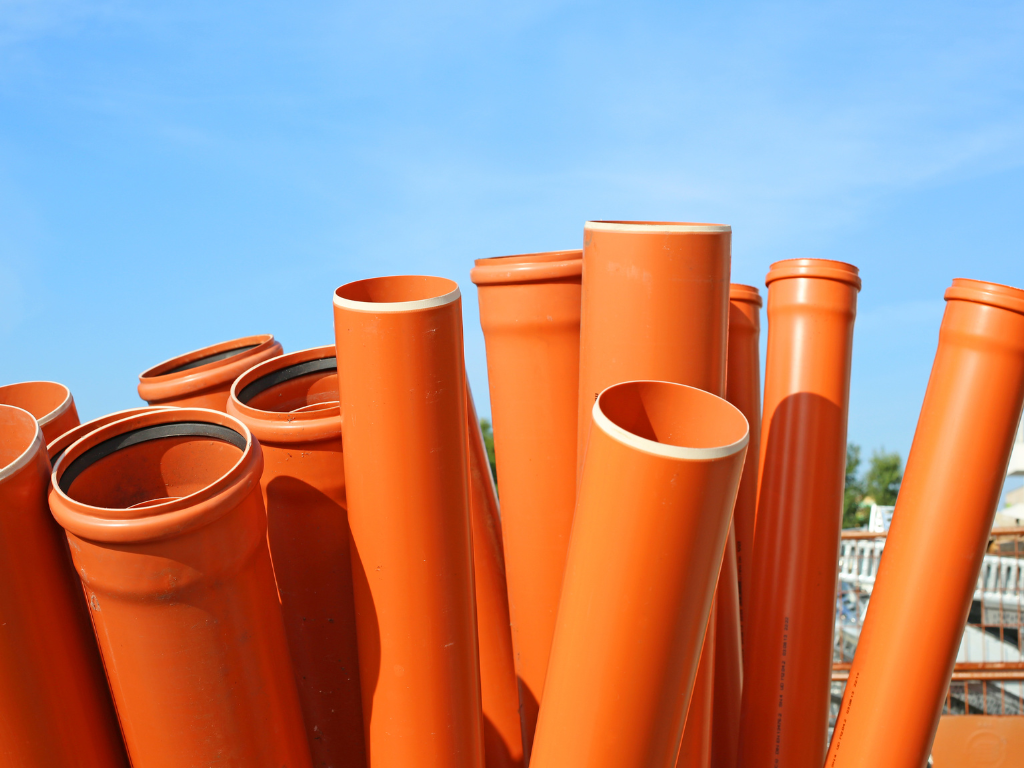4 Types of Drainage Pipes and Their Uses

Drainage systems can be so complex that most people know what their basic functions are, but not much about their material composition.
Because of this reason, many people find it hard to choose the most suitable pipes when installing a new system or modifying an existing one.
Knowing what drainage pipes are is often a good start to understanding drainage systems and the right piping fixtures to use. Here’s a helpful guide from our experts here at Polyfab, one of the top pipe installation companies in the UAE.
What are drainage pipes?
Pipes that facilitate the transfer of wastewater and other fluids from one place to another are called drainage pipes.
These plumbing fixtures have the important role of disposing wastewater from properties and transporting them to a wastewater treatment facility.
Drainage pipes also help prevent floods caused by swamp-like conditions and soil erosion.
What are the types of drainage pipes?
Drainage pipes are classified based on their design and material.
To help you know more about these plumbing fixtures and choose the right one for a particular project, below are the most common types of drainage pipes based on design and their uses:
1. Single-wall corrugated pipes
This type of drainage pipe is flexible and low-cost, making it easy to install. As such, it is a popular option for various drainage system projects.
These pipes are mostly used in undersoil drainage applications. Such types of underground drainage pipes are effective in collecting leachate belowground and controlling and directing underground water passages.
Single-wall corrugated pipes are also used to facilitate proper surface water filtration. Additionally, they can control water levels in airport runways, sports fields, and golf courses.
Lastly, the features of this pipe make it a popular option for land owners who need to improve soil conditions in their farmlands.
2. Dual-wall corrugated pipes
This type of drain pipe combines a corrugated outer wall and a smooth inner surface. As a result, it is known for its strength, durability, and impressive hydraulic characteristics.
Dual-wall corrugated pipes are recommended when wastewater contains floating debris and other substances. Therefore, these are widely used in belowground non-pressure applications, including storm sewers, drainage outlets, highway under-drains, and roadway culverts.
These pipes are also used as agricultural land drainage main lines.
3. Corrugated flexible drainage pipes
This kind of pipe is usually not as strong as the other types. However, it is flexible and comes in various sizes, including in 100-foot coils, making it a versatile fixture for different applications.
Corrugated flexible drainage pipes are popular options for French drains or weeping tiles, trenches filled with gravel or rock with perforated piping that redirects surface and groundwater away from a particular area.
This pipe is also used in retaining wall drainage and on properties where many turns are needed to run the piping to its final drain point.
4. Smooth wall pipes
These drainage pipes have a smooth surface facilitating the efficient flow of water from one place to another.
Smooth wall pipes are corrosion- and chemical-resistant. They are lightweight yet flexible and durable, and usually used in storm sewers and other high-end applications.
These pipes are further classified based on their drainage pipe material.
The most popular ones are:
PVC
Polyvinyl chloride or PVC is the most popular option for drainage pipes. This is mainly due to its strength, durability, longevity, malleability, and resistance to water, chemicals, and corrosion.
PVC drainage pipes come in various sizes, making them an excellent option for various drainage applications where the environment and water can exert great pressure and weight on the system.
This type of pipe is also recyclable, making it a sustainable option for drainage applications.
Because of these features, PVC underground drainage pipes are recommended for fluid transfer applications, including sewage, floodwater, hot water, municipal main water supply, and industrial chemicals.
PVCu/uPVC
Also called rigid PVC pipes, unplasticized polyvinyl chloride or PVCu (aka uPVC) pipes boast high mechanical performance, durability, and longevity. They are also known for their chemical and UV resistance.
Like PVC pipes, PVCu fixtures are environment-friendly and 100% recyclable.
PVCu pipes are excellent options for transporting sewage, soil, waste, and other underground drainage and industrial applications.
Cast Iron
Iron pipes are often chosen for drainage systems wherein strength is the most important required quality and the pipes won’t be used for gravity flow and other general purposes.
As such, they are often used in underground and under–road surface applications. They are also installed in water-logged areas where large soil movement may be expected.
Although these pipes are highly durable and affordable, they are prone to rust. When they start corroding, they become weak and may eventually break.
Moreover, the carrying capacity of cast iron piping decreases the longer it is used.
- Concrete
Concrete drainage pipes come in various sizes and shapes. Precast piping comes with easy-to-use fittings and can be installed quickly.
These pipes are strong, easily adaptable, and have high hydraulic efficiency.
However, concrete pipes are highly susceptible to the negative effects of saline and alkaline water exposure. Their transportation and installation costs are higher compared to the other options as well.
Additionally, the repair work for damaged concrete pipes can be expensive.
Each type of pipe comes with its own set of advantages and disadvantages. If you’re still puzzled over what pipes are used for drainage and unsure about which one to use for your drainage system, get more information and advice from a reputable supplier.
Get in touch with our sales team through our Contact Us page for help with your piping projects.
We're here to help
Let our specialists help you find the right piping products for your needs. Get access to expert services and top-of-the-line supplies for quality, on-time, professionally delivered projects. Get in touch with the Polyfab team today.
